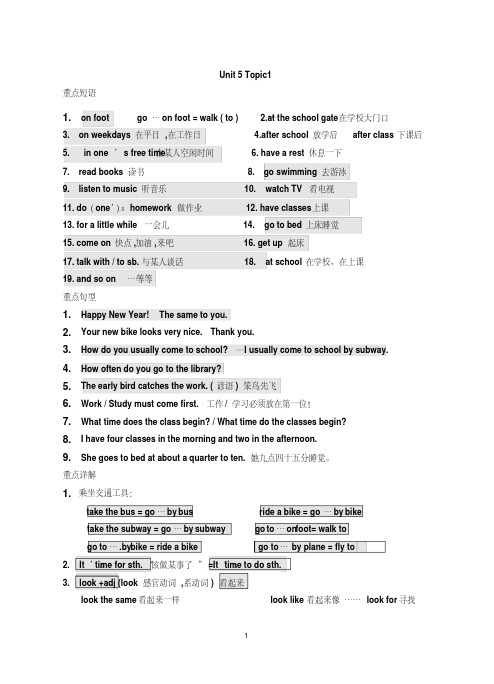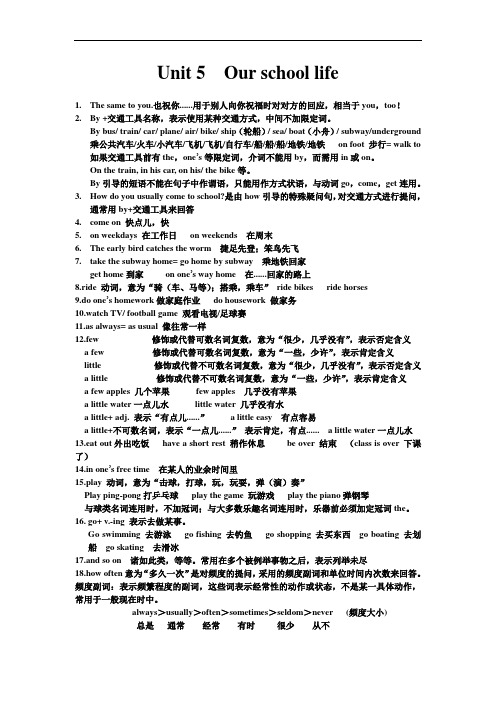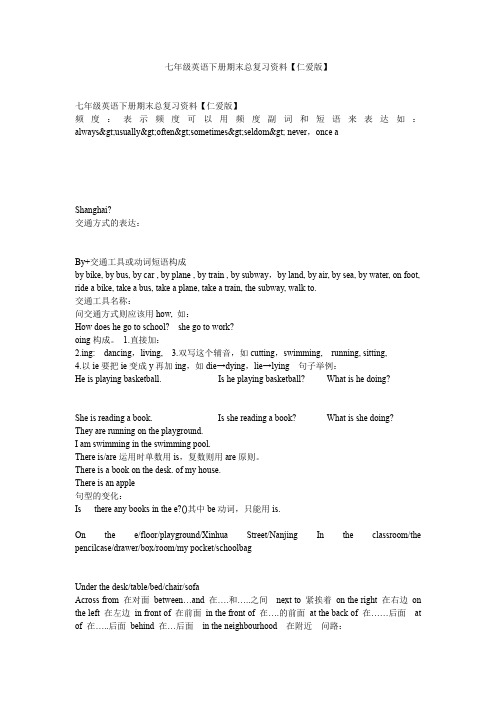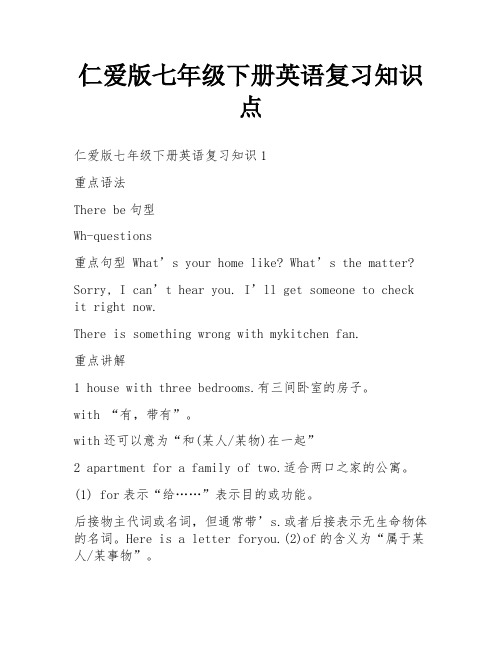新版仁爱英语七年级下册总复习资料
最新仁爱版七年级英语下册期末知识点总复习

Unit 5 Topic1重点短语1.on foot go …on foot = walk ( to )… 2.at the school gate在学校大门口3. on weekdays 在平日 ,在工作日4.after school 放学后after class 下课后在某人空闲时间 6. have a rest 休息一下5. in one’s free time7. read books 读书8. go swimming 去游泳9. listen to music 听音乐10. watch TV 看电视11. do(one’s)homework 做作业12. have classes 上课13. for a little while 一会儿14. go to bed 上床睡觉15. come on 快点,加油,来吧16. get up 起床17. talk with / to sb.与某人谈话18. at school 在学校、在上课19. and so on ……等等重点句型1.Happy New Year! The same to you.2.Your new bike looks very nice. Thank you.3.How do you usually come to school? —I usually come to school by subway.4.How often do you go to the library?5.The early bird catches the work. (谚语) 笨鸟先飞6.Work / Study must come first. 工作/ 学习必须放在第一位!7.What time does the class begin? / What time do the classes begin?8.I have four classes in the morning and two in the afternoon.9.She goes to bed at about a quarter to ten. 她九点四十五分睡觉。
(完整版)仁爱版七年级英语下册知识点总结

Unit 5 Our school life1.The same to you.也祝你......用于别人向你祝福时对对方的回应,相当于you,too!2.By +交通工具名称,表示使用某种交通方式,中间不加限定词。
By bus/ train/ car/ plane/ air/ bike/ ship(轮船)/ sea/ boat(小舟)/ subway/underground 乘公共汽车/火车/小汽车/飞机/飞机/自行车/船/船/船/地铁/地铁on foot 步行= walk to 如果交通工具前有the,one’s等限定词,介词不能用by,而需用in或on。
On the train, in his car, on his/ the bike等。
By引导的短语不能在句子中作谓语,只能用作方式状语,与动词go,come,get连用。
3.How do you usually come to school?是由how引导的特殊疑问句,对交通方式进行提问,通常用by+交通工具来回答e on 快点儿,快5.on weekdays 在工作日on weekends 在周末6.The early bird catches the worm 捷足先登;笨鸟先飞7.take the subway home= go home by subway 乘地铁回家get home到家on one’s way home 在......回家的路上8.ride 动词,意为“骑(车、马等);搭乘,乘车”ride bikes ride horses9.do one’s homework做家庭作业do housework 做家务10.watch TV/ football game 观看电视/足球赛11.as always= as usual 像往常一样12.few 修饰或代替可数名词复数,意为“很少,几乎没有”,表示否定含义a few 修饰或代替可数名词复数,意为“一些,少许”,表示肯定含义little 修饰或代替不可数名词复数,意为“很少,几乎没有”,表示否定含义a little 修饰或代替不可数名词复数,意为“一些,少许”,表示肯定含义a few apples 几个苹果few apples 几乎没有苹果a little water一点儿水little water 几乎没有水a little+ adj. 表示“有点儿......” a little easy 有点容易a little+不可数名词,表示“一点儿......”表示肯定,有点...... a little water一点儿水13.eat out外出吃饭have a short rest 稍作休息be over 结束(class is over 下课了)14.in one’s free time 在某人的业余时间里15.play 动词,意为“击球,打球,玩,玩耍,弹(演)奏”Play ping-pong打乒乓球play the game 玩游戏play the piano弹钢琴与球类名词连用时,不加冠词;与大多数乐趣名词连用时,乐器前必须加定冠词the。
仁爱英语七年级下册总复习资料

仁爱英语七年级下册总复习资料七年级英语(仁爱版)下册复习教案Unit 5 Our School Life任务形学习目标:1.掌握并能熟练运用表达交通方式的句型。
2.掌握频度副词的表达方式。
3.掌握一般现在是的用法。
重点词语:1.兼类词:early walk ride watch American rest play swim2.多意词:by乘车 by train\ subway靠近,在------的旁边by the fireplace在------时间 by the time被That card was made by Lucy.用by hand由People show their love to their mothers by giving cards and other presents.(1) 词组1. wake up2. take a subway3. ride a bike4. get to school5. have a shot break6. play basketball7. play computer games8. play the piano9. listen to music 10. go roller skating 11. write letters 1.at the school gate 2. at around six o’clock 3. on weekends = on the weekend 4.on weekdays 5.in one’s spare time 6. after lunch\breakfast\supper7.after school \class 8.a little while9.ONCE\TWICE\THREE TIME A WEEK------HOW OFTEN重点句型1. How do you usually come to school?(by bus \bike\ subway\ car\ train\ ship, on foot, on my bike, on a bus, in a car---)Do you often come to school by bike?2. How often do you go to library?(always\ usually\ often\ sometimes\ seldom\ never\ ---)3. What time do you get up on weekdays?4. You must go to school early.5. Your new bike looks very nice!6. They often play basketball or football, go swimming and so on.7. Work must come first8. She likes English best.9. The early bird catches the worm.10. It’s time for sb.to do sthIt’s time for + n.要点讲解1.如何正确乘坐交通工具(主要有两种表达方法:介词表达方法和动词表达方法)by +交通工具单词,且其前不加冠词,名词也不能用复数 on + the \ a \ +交通工具单词in + the \ a \ one’s cartake the\a bus \train\subway to--- = go or come to a place by busride the\a bike to school = come to school by bikewalk to the park = go to the park on footfly to a place = go to a place by plane2.区别下列特殊疑问词How often 多久一次,是提问频率的疑问词,回答常用频率副词,常与一般现在时连用。
七年级英语下册期末总复习资料【仁爱版】

七年级英语下册期末总复习资料【仁爱版】七年级英语下册期末总复习资料【仁爱版】频度:表示频度可以用频度副词和短语来表达如:always>usually>often>sometimes>seldom> never,once aShanghai?交通方式的表达:By+交通工具或动词短语构成by bike, by bus, by car , by plane , by train , by subway,by land, by air, by sea, by water, on foot, ride a bike, take a bus, take a plane, take a train, the subway, walk to.交通工具名称:问交通方式则应该用how, 如:How does he go to school? she go to work?oing构成。
1.直接加:2.ing: dancing,living,3.双写这个辅音,如cutting,swimming, running, sitting,4.以ie要把ie变成y再加ing,如die→dying,lie→lying 句子举例:He is playing basketball. Is he playing basketball? What is he doing?She is reading a book. Is she reading a book? What is she doing?They are running on the playground.I am swimming in the swimming pool.There is/are运用时单数用is,复数则用are原则。
There is a book on the desk. of my house.There is an apple句型的变化:Is there any books in the e?()其中be动词,只能用is.On the e/floor/playground/Xinhua Street/Nanjing In the classroom/the pencilcase/drawer/box/room/my pocket/schoolbagUnder the desk/table/bed/chair/sofaAcross from 在对面between…and 在….和…..之间next to 紧挨着on the right 在右边on the left 在左边in front of 在前面in the front of 在….的前面at the back of 在……后面at of 在…..后面behind 在…后面in the neighbourhood 在附近问路:Is there a post office near here?Where is the post office ,please ?How can I get to post office?指路:It’s over there .to the end.时间表达:几点:介词at+点钟(几点的表达有两种,顺读和逆读,逆读有两种情况,一用past,小于或等于30分时,二用to,大于30分时,此时整点部分应该加1)如:at six at twelve at ten past eight at a quarter past eighthalf past eight fifteen to eleven 注:顺读:10:40 ten forty哪天:用介词on+星期或日期(日期的表达,英式是:the+序数词的日+of+月份,美式是:月份+the+序数词的日)如:on Monday on Friday on April the tenth on the ninth of April序数词:first第一second第二third第三fifth eighth第八ninth第九twelfth第十二twentieth第二十twenty-first第二十一twenty-second 第二十二twenty-third哪年、哪月、哪个季节:介词用in 读)In 1996——in nineteen ninety-six谈论能力:使用情态动词can do sth. Sb can’t do sthCan sb do sth?动词过去式变1. watched looked2. lived loved liked danced3.y为i ,ed worried carried5. A—A A—B 型was are——were have/has——had go——went did+动词的过去式+其它。
仁爱版英语七年级下册知识点复习归纳(完整版)

仁爱版英语七年级下册知识点复习归纳(完整版)Ren'ai English Grade 7 Unit 5 Topic 1 ReviewKey Grammar: Present Simple Tense (often used with adverbs of frequency such as never。
seldom。
sometimes。
often。
usually。
always)Key XXX:How do you usually come to school?I usually come to school by subway.How often do you go to the library?XXX/Three times a week/Very often/Every day/SeldomXXX:1.I always come to school by bus。
"By" is used with the name of a n method。
without any articles in een。
If there is an article such as "a," "the," or "my" in front of the n method。
"in" or "on" should be used instead。
For example。
"on the train" is the same as "by train," "on his bike" is the same as "by bike," and "inmy car" is the same as "by car." To distinguish een "on foot" and "walk," "on foot" means "walking" XXX but only as an adverb of manner at the end of a sentence。
仁爱版七年级下册英语复习知识点

仁爱版七年级下册英语复习知识点仁爱版七年级下册英语复习知识1重点语法There be句型Wh-questions重点句型What’s your home like? What’s the matter?Sorry, I can’t hear you. I’ll get someone to check it right now.There is something wrong with mykitchen fan.重点讲解1 house with three bedrooms.有三间卧室的房子。
with “有,带有”。
with还可以意为“和(某人/某物)在一起”2 apartment for a family of two.适合两口之家的公寓。
(1) for表示“给……”表示目的或功能。
后接物主代词或名词,但通常带’s.或者后接表示无生命物体的名词。
Here is a letter foryou.(2)of的含义为“属于某人/某事物”。
She is a friend of Lily’s. = She is Lily’s friend.3 What’s the matter?怎么了?该句常用来询问某或某物出了什么什么问题或毛病;询问具体某人或某物出了什么问题时,还可以表达为:What’s the matter with sb./sth.某人或某物出了什么毛病。
What’s the matter? = What’swrong?4 Ihear you playing the piano.我听见你在弹钢琴。
hear…doing sth.“听见……在做某事”,强调正在进行的动作。
hear…dosth.“听见……做了某事”,强调全过程。
hearabout sth.听到关于某事物的消息 hear from sb.接到某人的来信、电话等hear of sb./sth.听到或知道某人或某事物的情况5 a lot of = lots of许多后接可数名词,相当于many;后接不可数名词,相当于much,用于肯定句中;但是注意:如果是否定句,则常用many或much.6 be far from… 离……远(抽象距离)be…away from…离……远(具体距离)My school is not far from thebookstore. The sea is 2 miles away fromthe hotel.7 There is something wrong with sb./sth.某人或某物出问题/有毛病了。
仁爱版英语七年级下最全全部全部知识点总结
[Preview]Grammar:1. Present Simple Tense: The basic form of the verb is used to talk about actions, habits, and general truths.2. Present Continuous Tense: Formed by using the verb "to be" with the present participle ("-ing" form) of the main verb, used to talk about actions happening now or in the near future.3. Past Simple Tense: Regular verbs form the past tense by adding "-ed" to the base form; irregular verbs have their own past tense forms.4. Past Continuous Tense: Formed by using the past tense of the verb "to be" with the present participle ("-ing" form) of the main verb, used to talk about actions in progress in the past.5. Future Simple Tense: Indicates actions that will happen in the future, formed using "will" or "shall" with the base form of the verb.8. Adverbs of Manner: Modify verbs and adjectives, answer the question "How?"9. Expressing Ability: Use modal verbs such as "can," "could," and "may" to talk about ability or permission.10. Articles: "A," "an," and "the" are used to indicate whether a noun is specific or nonspecific.11. Prepositions: Words that show the relationship between a noun/pronoun and other words in a sentence.Vocabulary:2. Verbs and Adjectives: Actions, feelings, descriptions, etc.4. Hobbies and Sports: Vocabulary related to leisure activities and sports.5. Jobs and Professions: Vocabulary related to different occupations.6. Places: Vocabulary related to different locations and buildings.8. Environment: Vocabulary related to nature, pollution, and conservation.Reading:2. Skimming and Scanning: Techniques for quickly locating information in a text.3. Inferred Meaning: Inferring information from context clues.4. Making Inferences: Drawing conclusions based on information provided.5. Critical Thinking: Analyzing and evaluating text to form opinions and make judgments.Listening:2. Listening for Specific Information: Identifying key details or specific information in spoken English.3. Understanding Dialogue: Listening to conversations and understanding the roles and intentions of the speakers.4. Listening for Inferred Meaning: Inferring informationthat is not explicitly stated from the context.Speaking:1. Dialogue Practice: Engaging in conversations with classmates or teachers to practice spoken English.3. Pronunciation: Practicing correct pronunciation of words and sounds.4. Fluency: Developing the ability to speak English smoothly and confidently.Writing:1. Sentence Structure: Writing sentences with proper grammar and word order.2. Paragraph Writing: Organizing ideas and writing coherent paragraphs.3. Descriptive Writing: Using adjectives and sensorylanguage to describe people, places, and things.4. Narrative Writing: Writing stories with a clear beginning, middle, and end.5. Letter Writing: Understanding the format and structure of formal and informal letters.7. Editing and Proofreading: Correcting errors in spelling, grammar, punctuation, and sentence structure.。
仁爱版英语七年级下册知识点复习归纳
千里之行,始于足下。
仁爱版英语七年级下册知识点复习归纳
仁爱版英语七年级下册的知识点复习归纳如下:
Unit 1-5: 发音、单词、词组、语法(一般现在时、一般过去时、现在进行时、一般将来时)、日常用语、听力训练
Unit 6: 日常用语、单词、词组、语法(一般现在时、一般过去时、现在进行时)、听力训练
Unit 7-8: 日常用语、单词、词组、语法(一般现在时、一般过去时、现在进行时、一般将来时)、听力训练
Unit 9: 日常用语、单词、词组、语法(一般现在时、一般过去时、现在进行时、一般将来时、情态动词)、听力训练
Unit 10-11: 日常用语、单词、词组、语法(一般现在时、一般过去时、现在进行时、情态动词、动词不定式)、听力训练
Unit 12: 日常用语、单词、词组、语法(一般现在时、一般过去时、现在进行时、情态动词、被动语态)、听力训练
Unit 13-14: 日常用语、单词、词组、语法(一般现在时、一般过去时、现在进行时、完成时、情态动词、宾语从句)、听力训练
Unit 15: 日常用语、单词、词组、语法(一般现在时、一般过去时、现在进行时、完成时、情态动词、宾语从句、名词性从句)、听力训练
第1页/共2页
锲而不舍,金石可镂。
以上是仁爱版英语七年级下册的知识点复习归纳,主要包括发音、单词、词组、语法、日常用语和听力训练。
复习这些知识点能够帮助学生巩固和提高英语水平。
仁爱版英语七年级下册知识点复习归纳
仁爱版英语七年级下册知识点复习归纳仁爱版英语七年级下册知识点复习归纳(完整版)仁爱版英语七年级下册知识点归纳英语七年级下册知识点归纳Unit 5 Topic1重点语法一般现在时(常与频度副词never, seldom, sometimes, often,usually, always等连用)重点句型—How do you usually come to school?—I usually come to school by subway.—How often do you go to the library?—Once/Twice/Three times a week/Very often/Every day/Seldom重点详解1I always come to school by bus.by+交通工具名称,表示使用某种交通方式,中间不加限定词,如果交通工具前有a, the, my等限定词,就不能用by,而是用in或是on.on the train=by train on his bike=by bike in my car=by car.巧辩异同on foot与w alk on foot“走路”,是介词短语,不能作谓语,只作方式状语,位于句末。
walk“走路”,是动词,可以作谓语。
goto…onfoot= walk toI often go to school on foot. =I often walk to school.仁爱版英语七年级下册知识点复习归纳(完整版)同样,go to….bybike = ride a bike togoto….by car = drive a car togo to…by plane = fly togoto…b y bus = take a bus to2 Come on!It’stime for class. come on“快点,加油,来吧”。
It’stime for sth.“该做某事了”,与It’stime to do sth.意思一样。
仁爱英语七年级下册总复习资料
�语短点重�二 ? loohcs ot emoc yllausu uoy od woH 1 cipoT
。法用的是在现般一握掌 .3 。式方达表的词副度频握掌 .2 。型句的式方通交达表用运练熟能并握掌 .1 �标目习学形务任
efiL loohcS ruO 5 tinU 案教习复册下�版爱仁�语英级年七
法用的型句 eb erehT �识知法语、三 hts od ot tnaw/hts od ot bs tnaw .41 hts bs lleT hts od ot bs lleT hts tuoba bs lleT .31 hts od/hts gniod bs raeh 用常。果结的听重侧�见听�到听 raeh�)物(人某说听 fo reh�信是不人是语宾 morf raeh 意注 bs morf raeh =bs morf rettel a teG .21 里墙在 llaw eht ni 上墙在 llaw eht nO .11 �空悬�上河在 revir eht revo 上面水在浮 revir eht nO .01 )西东的身本树(eert eht nO 上树在�西东的身本树非�eert eht nI .9 管看�顾照 fo erac ekat = retfa kooL .8 好拾收们他把 yawa meht tuP .7 论谈人某和.bs htiw klat 论谈 tuoba klaT .6 面前�的面外�子屋 在 esuoh eht fo tnorf nI 面前�的面里�子屋在 esuoh eht fo tnorf eht nI .5 别区的 nrael 与 习学�词动 房书�词名 yduts 。yduts ecin a evah uoY .4 后以会一 retal tnemom A .3 楼下 sriatsnwod oG 楼上 sriatspu oG .2 式方的议建提他其习复 uoy t’nod yhW= ton yhW .1 楼一示表 roolf dnuorg eht 用语英式英。 ”层的房楼“指处此�板地 roolf 楼一语英式美 roolf tsrif eht nO 组词点重、二 fo tnorf ni ,ot txen ,raen ,rednu ,dniheb ,no ,ni 词介位方握掌练熟、4 筑建等校学、庭家、间房写描语英用练熟能、3 法用及式形种各的 eb ereht 握掌、2 组词点重和词单握掌、1
- 1、下载文档前请自行甄别文档内容的完整性,平台不提供额外的编辑、内容补充、找答案等附加服务。
- 2、"仅部分预览"的文档,不可在线预览部分如存在完整性等问题,可反馈申请退款(可完整预览的文档不适用该条件!)。
- 3、如文档侵犯您的权益,请联系客服反馈,我们会尽快为您处理(人工客服工作时间:9:00-18:30)。
Unit 5 Our School LifeTopic 1 I usually come to school bu subway。
重点短语1. on foot go …on foot = walk ( to )…2.by plane/ship/bus/subway3. on weekdays 在平日5. after school 放学后6. in their free time 在空闲时间7. have a rest 休息一下 8. do(one’s) homework 做作业9. once a week 一周一次10. have classes 上课11. at the school gate 在校门口 12. come on 快点、加油13. Talkwith to sb.与某人谈话 14.for a short time 一会儿15.know about 了解语法:表时间频率的副词:never 从来不 seldom 极少 sometimes 有时 often 经常usually 常常 always 总是四. 重要句型1. Happy New Year! The same to you.2. Your new bike looks very nice. Thank you.3. How do you usually come to school ? By bus / car / bike. On foot.4. It’s time for class. = It’s time to have class. 该是上课的时候了。
5. The early bird catches the worm. 笨鸟先飞。
/ 捷足先登。
6. We have no more time. 我们没有更多的时间了。
7. She goes to bed at about a quarter to ten.她九点四十五分睡觉。
8.How often do you come to the library? Three times a week./Very often./Every day.9.What time do you usually get up on weekdays? I always get up at about six o’clock.Topic 2 A few students are running on the playground.重点短语:1.make cards 制作卡片2. on the playground 在操场上3. in the library 在图书馆4. in the gym在体育馆5. on the shelf在书架上(shelves 复数)6.at the Lost and Found 在失物招领处7.do some cleaning 打扫 8.swimming poor 游泳池9. some of his photos= some photos of his 他的一些照片10. on time 准时/in time及时 11.Look for 寻找12.put on 穿、戴上13.show sb. around…令某人参观……14.a few 一些 15.at the back of 在……后面16.borrow sth from…从……借回某物……四. 重要句型1.Excuse me, may I borrow some English workbooks? Of course. = Sure.2. How Long can I keep them ? Two weeks.3.You must return them on time. ( return 归还,return sth to …把……归还给……) Sure,I will.thank you.4.Sorry, we don’t have any. Thank you all the same.5.Are you doing your homework? Yes,I am./No, I’m not.6.what are you doing? I’m looking for my wallet.7.第三人称单数一样问法,只不过be动词变一下,详见课本P15页。
Topic 3 My school life is very interesting.重点短语:1.outdoor activities户外活动2. easy and interesting 容易又有趣3.difficult and boring 又难又乏味4.be kind to sb. 对某人友好5.between…and…在……之间…6.learn…from…从…中学……7. from…to…从……到…… 8.tell sb. about sth告诉某人关于某事9.think of 认为 10.a little 有点儿11.class meeting 班会 12.draw pictures 画画课本20页也要看。
重要句型1.What day is it today? Wednesday.2.What class are they having ? They are having a music class.3.What time does the next class begin ? At ten o’clock.4.What do you think of it? / How do you like it? It’s difficult and boring.5.Why do you like English ? Becauseit’s easy and interesting.6.What subject (学科)do you like best ? I like history best.7.How many English lessons does he have every week? Five.8.Can you tell me something about it ?9.my teachers and classmates are very kind to me.10.My school life is very interesting.Unit 6 Our Local AreaTopic1 Is there a computer in your study?重点词组1.Go upstairs上楼2.You have a nice study。
study名词:书房动词:学习与learn的区别3.In the front of the house 在屋子(里面的)前面In front of the house在屋子(外面的)前面4.talk about谈论 talk with sb.和某人谈论5.put……away 把……收拾好6.look after 照顾,看管 and so on 等等7.in the tree(非树本身的东西)在树上 On the tree(树本身的东西)8.On the river浮在水面上 over the river 在河上(悬空)9.On the wall在墙上in the wall 在墙里10.tell sb about sth tell sb to do sth tell sb sth11.want sb to do sth/want to do sth12.On the first floor 13. have a look14. next to 在……近旁 15.in the center of 在……中心16. play with 一起玩耍 e in 进入,进来17. Living room 客厅,起居室 18.so many 如此多语法知识: 1.What’s on the desk? There’re some model planes on it.2.How many model planes are there? There are three.3.Is there any water in the bottle? Yes,there is./No,there isn’t.4.How much water is there? Only a little.5.Don’t put it/them there.6.Put it/them away ,please.7.You must look after your things. 8.Where is the guitar? It’s on the wall.Topic 2 My home is in an apartment building重点短语:1.on the corner of 拐角处2.for rent 出租(rent sth to sb把某物租给某人rent sth from sb 从某人处租某物。
)3.post office 邮局4.parking lot 停车场5.at the end of6.such as 例如7.close to (be close toclose 与near 都有“靠近”的意思,但close 比near 更近)8.far from 远离 9.call sb. at +号码。
请打......电话与某人联系。
重点句型:1.What kind of home do you live in? It’s a townhouse with tow floors.2.How many floors are there in your building? There are seven.3.Do you like living there? Yes,I do.4.Michael is looking for an apartment near our school. Let’s help him.5.could you help me? Of course.6.Is there a bank near here? Are there any near here?Topic 3 Which is the way to the hospital?重点短语:1.a ticket for speeding 超速罚单2.go along/up/down 沿着走3.turn left/right向左转/向右转4.acrossfrom 在……对面5.change to变成6.no parking禁止停车7.get hurt受伤 8.obey the traffic rules 遵守交通规则9.keep on the right of the road 保持在路的右边10.at the foot of 在……的脚下 11.hold sth in one’s hand抓住某人的手12.traffic lights 交通灯 13.make a wrong turn 转向错误14.public phone 公用电话 15.on the street 在街上重点句型:①Excuse me,how can I get to the library??②Is there a bank near here?③Which is the way to the hospital?④Could you tell me the way to Dinghao Building?⑤Where is Beitai Road?⑥It’s about 15 kilometers away from here. You can’t miss it.Unit 7 The Birthday PartyTopic1 When is you birthday ?重点词组:1.Plan to do sth2.have a birthday partye sth to do sth3.buy sb sth=buy sth for sb重点句型1.When were you born? I was born in June,19702.Were you born in He bei? Yes,I was, No,I wasn’t.3.Where was she born? She was born in Wales,the UK.4.When was she born? She was born on october 22th,1996.5.What’s the date today? It’s May 8th.6.What’s the shape of your present? It’s round.7.What shape is it?/What’s the shape of...?It’s a rectangle.8.How long/wideis it? It’s ... Centimeters long/wide.9.What do we use it for? We use it to ...10.Here is a present for you.11.You’re a big fan of J.K.Rowling.12.When is your birthday? May 13th.13.How do you plan to celebrate it? My friends want to have a birthday party for me.14.What is your present for KangKang’s birthday?15.May I have a look? Sorry,I’m afraid you can’t.16.What is it like? It is like a flower.17.Was it like a flower before? No,it wasn’t.It was like a star.18.What shape was it before? It was a square.Topic2 I can dance and play the guitar.重点词组:1. at the birthday party在生日聚会上2.perform ballet跳芭蕾舞3.dance to disco 跳迪斯科4.take… to 把…带去…5.work out math problems 解出数学题6.read books 读书7.fly a klite放风筝 8.be good at / do well in doing擅长做…9.have a good time /enjoy oneself玩得开心10.at the age of 在……岁时11.with one’s help / with the help of 在某人的帮助下12.have a good time 玩得高兴 13.not…any more 再也(不),(不)再重点句型:1.What would you like to do at KangKang’s birthday party?I’d like to play the piano and sing some songs.2.Do you want to sing Chinese songs or English songs? Chinese songs.3.What else can you do? I can dance and play the guitar.4.Would you like to sing with me? Yes,I’d love to.5.I’m sure we’ll have a good time at the party. P67课文要背Topic 3 Everyone hag a good time.1.birthday party 生日聚会2.sing a song唱歌3.enjoy oneself 过得愉快4. play the piano 弹钢琴5.fall down 掉下6. hurt oneself 伤了自己7.make a wish许愿8.by hand 亲手9.at once 立刻,马上 10.blow out 吹灭重点句型1.How was KangKang’s birthday party? It was very nice.2.Did you sing a song at the party? Yes,I did.3.What about/How about Tom? He performed some magic tricks.4.Did KangKang enjoy himself?(enjoy doing sth.) Of course.He was very happy.5.What’s the matter? I missed the chair and fell down.6.Did you hurt yourself? No,I didn’t hurt myself.I’m OK.7.Where is the washroom? This way,please.8.What timedid you come home last night?9.I’m afraid it was too late. 恐怕太迟了。
